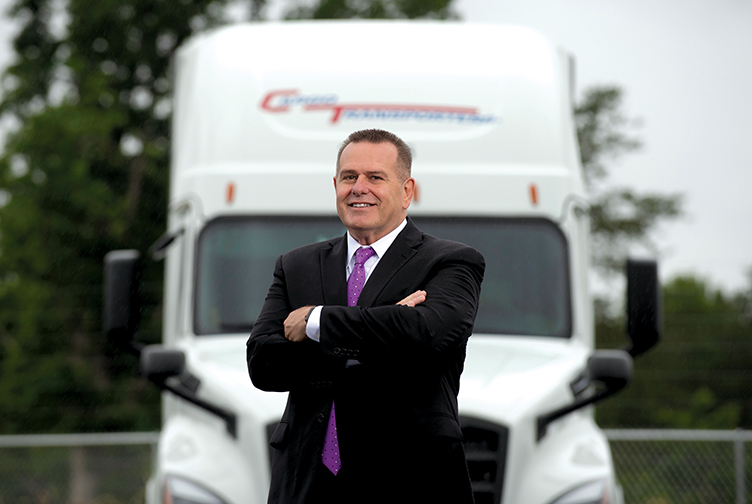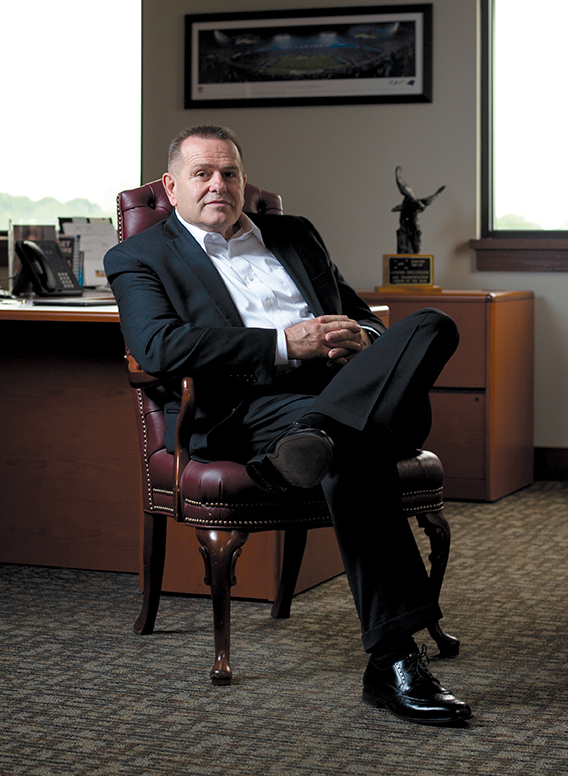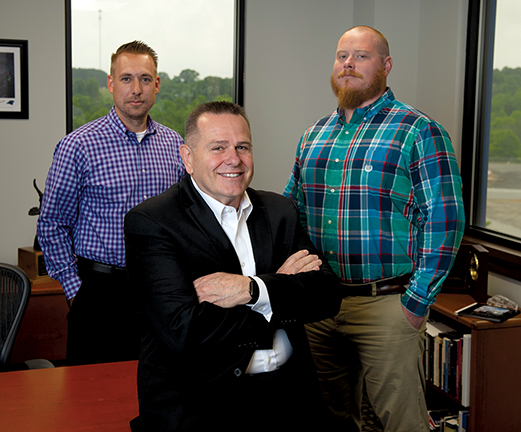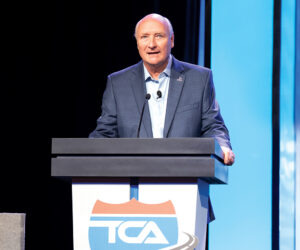Like others before him, Dennis Dellinger has spent countless hours carrying out his duties as chairman of the Truckload Carriers Association. He, like the others, notes that he could not have been successful without the support of family and friends — especially his family. Dellinger begins his next-to-last Chat With the Chairman by sharing what his family and friends mean to him. This chat also includes photos of his family. Dellinger’s words follow:
“Family and friends have always held an important place in my heart, and it is my belief that our life is exactly what our relationships make it. I was raised in a house with five sisters and one brother. Needless to say, I have a rather large immediate and extended family. People always say, ‘To be happy, you have to be happy with yourself.’ While I agree, we also have to learn to live well with others to be happy. Living and growing up in a large family taught me this and shaped the person I am today. Friends, like family, can be as equally important to get you through life’s difficulties and hardships. I like to think friends are the family we choose for ourselves. I am most lucky to be married to my best friend and life partner, Sherel. Sherel has been supportive of my endeavors at Cargo Transporters and TCA, allowing me to balance my work life, association life, and family life. While we love all of our family and friends, spending time with our grandchildren is like the icing on the cake.”

Mr. Chairman, when Truckload Carriers Association members read this chat, you will have completed almost three-fourths of your term. It certainly has been a busy almost-nine months. What are some of the organization’s accomplishments since we last spoke, and what is on the agenda for the remainders of your term?
While COVID-19 and the 2020 elections have been in the news, the work at TCA has never slowed. TCA has continued to keep the membership informed through its weekly messaging, held a successful virtual Safety and Security Meeting, wrapped up the fiscal year in good financial standing, and held an equally successful virtual Fall Business Meetings that included passage of the 2020-21 budget. There is much more to get accomplished. We are still working on preparations for the Fourth Annual Bridging Border Barriers meeting and working extensively on TCA’s Annual Convention: Truckload 2021.
Let’s review some of those activities surrounding the Association and discuss two activities relative to issues important to TCA. First, the Association has experienced tremendous success with its annual Call on Washington program. Because of the pandemic, members weren’t able to come to Washington; however, personal contact via social media and one-on-one phone calls benefited the truckload environment and continued the momentum the Washington visit brings to the Association. Please share the feedback you’ve received since the event, and tell us why, personal contact with lawmakers and other government officials is so important to the mission of TCA. Second, the TCA Fall Business Meetings, which included several committee meetings, were held via Zoom. We hear participation was at an all-time high. please Share with members the highlights of the business meeting.
In an effort to place the health and safety of our membership at the top of our priorities, we chose to host the Fall Business Meetings virtually. The feedback I have received was positive from those that participated in the sessions. The opportunities to communicate with Congressman
David Price (D-NC-4) and Senator Roger Wicker (R-MS) were also well received. While the pandemic closed down the offices on Capitol Hill, it was great to have the Chairman of the Transportation, Housing and Urban Development Appropriations Subcommittee and the Chairman of the Senate Committee on Commerce, Science and Transportation brief our members on current issues related to the truckload environment and recognize TCA as an integral part of the legislative process. We have always insisted that we should embrace every opportunity to tell our story. This collaboration of industry and lawmakers has proved to be beneficial. While in-person visits have been temporarily halted, our relationships have continued to keep TCA front and center amongst our elected officials.
Secondly, consistent with TCA’s bylaws, it was important the Fall Business Meetings be conducted. Success of the previously held virtual Safety and Security Meeting allowed TCA staff the confidence to hold all committee meetings in a similar platform. Our policy committees used this opportunity to brief the members on important issues pertaining to our industry. Highlights included a presentation from FMCSA on the new hours-of-service provisions, an election update from our Capitol Hill lobbyists on key battleground races, and other important items on the horizon at FMCSA that will define the future of truckload. That discussion included items surrounding hair testing, the younger-driver pilot program, and the ongoing alternative to funding infrastructure by means such as a mileage-based user fee. Committees were also briefed on membership efforts, important industry image campaigns, and upcoming educational opportunities. There is nothing like in-person meetings; however, technology allowed TCA to share the same information had we been together as a group.

Speaking of TCA events, the Fourth Annual Bridging Border Barriers meeting, where industry executives and key association leaders meet to discuss and learn about current and potential cross-border issues facing the industry, will be a virtual meeting on November 19. Why has this event become more important and beneficial to members?
TCA’s Bridging Border Barriers event represents an opportunity for TCA to reach out to its extensive Canadian membership. Recognizing the important role our fellow Canadian truckers play in the truckload environment and at TCA, it made sense to convene a meeting in Canada. This allows member companies to involve people who may not be able to attend TCA events held in the U.S. The event has turned into an excellent setting for our members to connect, continue to emphasize the TCA brand in Canada, and participate in the great educational and informational aspects that TCA has to offer. The momentum created over the past three years needed to be bridged. TCA is excited to be going virtual until we can once again meet in person.
Planning is well under way for TCA’s Annual Convention, Truckload 2021: Nashville, to be held January 26-30, 2021, at the Gaylord Opryland Resort & Convention Center in Nashville, Tennessee. Share with members a sneak preview of the convention, which we understand is being planned as an in-person event.
I know that I am not speaking for just myself when I say that there is a certain element of what I will call “Zoom fatigue” permeating throughout our industry. Our industry is one that has been developed through face-to-face networking through which long-lasting relationships have been built over time. That being said, the last in-person TCA event that the majority of our membership experienced was Truckload 2020 in Orlando, and many have communicated to us a strong desire to get back to seeing everyone in person. Truckload 2021 represents a tremendous opportunity to do just that. The convention itself will continue to offer attendees a primetime venue at the Gaylord Opryland to network and reacquaint themselves with friends that they may not have seen in person for almost a year. The final touches are currently being made to the educational agenda, but I do know that we will be offering high-quality keynote speakers, as well as excellent panel discussions by industry stalwarts that are certain to pique everyone’s interest. In short, this meeting, getting back to business in a manner that we have missed, will be well worth it in terms of attending. I look forward to seeing everyone in person again.
Speaking of TCA accomplishments, Truckload Academy has become a staple of life at TCA. Share with members some of the success stories you’ve heard about Truckload Academy and why members who are not utilizing this service do so.
TCA’s Truckload Academy has been a well-positioned resource throughout the COVID-19 pandemic and offers professional insight and development for all levels within a carrier’s operations. Sessions this year have addressed leadership, driver wellness, communications, compensation strategies, and driver recruitment and retention. More than 4,000 registrants have actively taken advantage of these live sessions, while nearly 1,000 individuals have viewed the recorded sessions at a later time. One carrier member believed so much in the Certificate of Fleet Management (CFM) program they enrolled 60 employees. This was done to heighten the team’s collective knowledge and understanding that communication and safety work in tandem each and every day. I’d be remiss not to include that TCA is positioned to offer continuing educational classes for safety professionals and additional certificate programs as well.
Let’s look at some industry news. September 30 has come and gone without passage of a new highway reauthorization bill to replace the FAST Act, which expired on that day. As a result, the industry is operating under another continuing resolution that extends the FAST Act for one year. How does having to operate under a continuing resolution impact the trucking industry?
It only seems like business as usual to have received a one-year extension of the FAST Act. If you recall, we went through roughly 13 extensions of MAP-21 prior to enactment of the FAST Act. Facts are, congestion creates inefficiencies for our industry, and we need better roads and bridges. I’m not here to point fingers at either political party, but resolution on an infrastructure package will require working across the aisle should Congress be divided by leadership in the House and Senate post-election. We, as an industry, have to continue to work both sides of the aisle to forward our agenda.
Of course, a highway bill, whether it be the FAST Act or its successor, only establishes how money can be spent on repairing existing roads and bridges and building new ones. Funding of the work is another matter. What do you hear about the possibility of either the current or the new Congress passing a funding mechanism for the Highway Trust Fund in the near future?
Advocating for a federal fuel tax increase is the most cost-effective solution to the problem at hand. We spoke earlier as to why the need to maintain contact with congressional leadership is important — this is one of those reasons. The FAST Act maintained the status quo on highway funding, which has proven inadequate. We all know inflation will not allow us to buy something in 2020 at 1993 pricing; yet we continue to battle the same as it relates to our failed infrastructure and how to pay for such. Creating a self-sustaining funding mechanism for our infrastructure is paramount to maintaining and building new roads and bridges that our nation desperately needs.

The Federal Motor Carrier Safety Administration (FMCSA) has initiated three activities important to the trucking industry. We will address them one at a time. First, the FMCSA is proposing and seeking public comments on a new pilot program to allow drivers aged 18, 19, and 20 to operate commercial motor vehicles in interstate commerce. Please share TCA’s opinions and thoughts about the pilot program.
The introduction of a second pilot program to address the safety performance of a younger driver demographic became a regulatory reality after the first attempt, based on the performance of younger drivers with a military background, failed to gain the proper number of drivers to study. TCA supports the efforts to aid in placing professional drivers, ages 18-20 years old, into interstate commerce. The reality is the drivers in question have already obtained their commercial driver’s license (CDL); they are just limited in operations from crossing state lines. Now, this pilot program is designed to study the safety performance of these drivers because there remains little data existing in a public format to determine whether they can operate in a fashion that is as safe, or safer, than their senior counterparts. Much like the DRIVE-Safe Act, which TCA also supports, these efforts are designed to create avenues that will attract drivers to our industry.
Secondly, FMCSA is seeking public comment on a pilot program to allow additional hours-of-service (HOS) regulatory relief by allowing participating drivers to pause their on-duty driving period with one off-duty period up to three hours. If this pilot program leads to a rulemaking, an easy assumption would be that this would further add flexibility to the new HOS rule that went into effect September 29. What are your thoughts?
Since the implementation of electronic logging devices (ELDs) in our industry, the data generated has painted the perfect portrait of what the driver’s day looks like. Reoccurring issues like detention time, congestion on our highways, and searching for safe parking have become impediments to drivers actually driving. Pre-COVID-19, our industry was only averaging between 6.5 to 7 hours of drive time per day. While these problems have existed much longer than the ELD, paper logs did not allow visibility outside individual companies. Now, having that visibility points out the necessity to review and potentially change rules or regulations that may be antiquated. A pilot program would help FMCSA determine if this proposed flexibility reduces fatigue and promotes a more rested and safer driver.
Third, the FMCSA has announced it will be launching a new panel to its Motor Carrier Safety Advisory Committee (MCSAC), comprised of commercial motor vehicle drivers, to provide direct feedback to FMCSA on important issues facing the driving community. What are TCA’s thoughts on the formation of this panel?
One of the things I have always believed is that if you want to improve upon any particular regulation, speak to your drivers. That is the frame of mind that FMCSA is coming from regarding this panel. Developing a subcommittee of 25 drivers is a great step toward getting a realistic viewpoint of life on the highway. My hope is that the agency and its corresponding MCSAC will listen to the drivers’ feedback.

We all know that driver turnover hits hard on the bottom line. Therefore, it is important to hire drivers whose past doesn’t include substance abuse. The Drug and Alcohol Clearinghouse has been operational for over nine months. What do you hear from TCA members about how this tool has helped them in driver recruiting and retention?
The Drug and Alcohol Clearinghouse was definitely long overdue. Anytime you can go to one central place to extract data, it can’t be anything but positive. Waiting to obtain information from former employers was cumbersome to carriers attempting to hire individuals in a timely manner. Greater frustration was created by the inability to even contact previous employers on the same matter. I am actually hearing more buzz about how surprised people have been on the number of positives recorded.
The Department of Labor has proposed a rule that would clarify the definition of employee under the Fair Labor Standards Act (FLSA) as it relates to independent contractors. Among other things, the proposed rule adopts an “economic reality” test to determine a worker’s status as an FLSA employee or an independent contractor. The test considers whether a worker is in business for himself or herself (independent contractor) or is economically dependent on a putative employer for work (employee). Without such a rule, the independent contractor status for owner-operator appears in jeopardy. Does TCA support this proposed rulemaking?
I think that it would be prudent to point out that many founders of this country’s successful truckload carriers, even the large ones operating on our highways today, started out as independent contractors. In knowing that, TCA does support the rulemaking in an effort to protect this tried-and-true business model that has permeated trucking since the industry started. The reality is, owner-operators choose this business model because it is right for them. The opportunity to build your own business, control your own costs, and make your own schedule are enticing to some people and represents an opportunity to reach for the American dream. Creating a standardized test would certainly go a long way toward maintaining the status of independently owned businesses and continue to emphasize that there are pathways in this country to starting your own business and being your own boss.
Mr. Chairman, on a personal note, please take a minute and share with members what the upcoming Christmas/New Year’s Day holiday season means to the Dellinger family and offer a word of greeting to TCA members.
During the holiday season, I look forward to spending time with family and friends, partaking in food and fellowship. In this time of uncertainty, Christmas is a reminder of God’s gifts to us and the blessings he has bestowed upon us. I have been blessed beyond measure with a beautiful family, great friends, much opportunity, and good health. I would like to wish each of you a Merry Christmas and a Happy New Year!
Lyndon Finney’s publishing career spans over 55 years beginning with a reporter position with the Southwest Times Record in Fort Smith, Arkansas, in 1965. Since then he’s been a newspaper editor at the Southwest Times Record, served five years as assistant managing editor of the Arkansas Democrat-Gazette in Little Rock and from November 2004 through December 2019 served as editor of The Trucker. Between newspaper jobs he spent 14 years as director of communications at Baptist Health, Arkansas’ largest healthcare system. In addition to his publishing career he served for 46 years as organist at Little Rock’s largest Baptist church.











